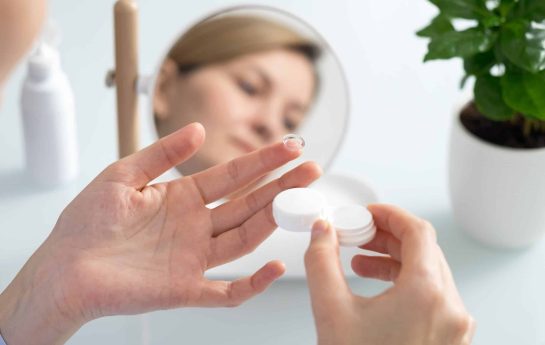Cornea Specialist - Dr Geoffrey Ryan
All the support you need for the treatment of your corneal condition
We know that corneal conditions can be scary. Whether you’re experiencing keratoconus and need a corneal graft, have had ocular trauma, require cataract surgery, have corneal scarring, or another corneal condition, it’s important to feel that you’re in the capable hands of an experienced ophthalmologist. Dr Geoffrey Ryan is a Brisbane cornea specialist and has completed extensive studies in these conditions, along with advanced training in their treatments — including corneal transplant surgery and complex corneal surgery techniques using donor cornea in appropriate cases.
Book your appointment with ophthalmologist Dr Ryan today. Fill out our convenient enquiry form or give us a call on (07) 3239 5000 to organise your consult.


Corneal eye specialist near me
We understand that eye conditions and their treatment can make for a stressful time, which is why we provide continued support throughout your time with us. Our caring team is here to provide answers to any questions or doubts you may have, and Dr Ryan will talk you through each step of the treatment plan to ensure that you feel comfortable and well informed.
Our eye clinic is located within the Queensland Eye Institute. It’s from here that we conduct both consultations and surgeries. As a highly experienced eye surgeon, Dr Ryan provides treatment for a number of corneal and other eye conditions. This includes removal of ocular surface tumours, removal of cataracts, corneal grafts, corneal surgery, refractive surgery, and a number of other ophthalmology specialties. He also works with donated corneas and healthy donor tissue where required.
Whether your vision has been impacted or you had no symptoms and your optometrist has referred you, Dr Ryan is a cornea specialist in Brisbane who will provide you with the support you need — from diagnosis to follow-up care.
Common conditions
There are a range of eye diseases and corneal conditions that can be treated by Dr Ryan. Here is an overview of some common eye conditions and their treatments:
Keratoconus
Keratoconus is a corneal condition that typically affects younger patients. It's often noticed when the patient experiences blurred vision or frequently changing lens prescriptions. As an evolving disease, keratoconus can have a varying range of treatments, from glasses or contact lenses to corneal transplantation or corneal transplant surgery in advanced cases.
Ocular surface tumours
There are three types of malignant or premalignant neoplasias that arise from the conjunctiva of the cornea. These are ocular surface melanocytic tumours, ocular surface squamous neoplasia (OSSN), and lymphoid tumours of the conjunctiva. Ocular surface tumours are typically treated with excision and topical chemotherapy.
Corneal dystrophy
Corneal dystrophy is an eye disease that causes changes in the cornea. The most common is Fuchs’ endothelial dystrophy. It may cause pain and vision loss, or have no noticeable symptoms. As the disease progresses, you might need surgery such as a full thickness corneal transplant or corneal graft.
Fuchs’ dystrophy
Fuchs’ dystrophy is a progressive eye condition that affects the inner layer of the cornea responsible for maintaining fluid balance. Over time, these cells deteriorate, causing the cornea to swell and resulting in blurred vision, glare, and discomfort. Initial treatment may include eye drops to reduce swelling, but for more advanced cases, surgical options such as a partial thickness transplant may be recommended, often involving donor tissue. In some cases, procedures like endothelial keratoplasty or penetrating keratoplasty may be used to help restore vision.
Dry eye and ocular surface disease
Dry eye disease (DED) is a multifactorial disorder of the tears and ocular surface. Sometimes referred to as keratoconjunctivitis sicca, patients experiencing DED may have dryness, irritation, light sensitivity, and itching in the eyes.
We use world-leading equipment
Consulting and operating out of the Queensland Eye Institute, we’re fortunate to have modern facilities and state-of-the-art equipment for both diagnosis and surgery. As well as our world-leading equipment, we’re surrounded by a range of ophthalmology experts and eye specialists to help us provide you with high-quality care.
Ready to discuss your treatment options? Book an appointment with Dr Ryan today. Fill out our convenient enquiry form or call us on (07) 3239 5000 to make your booking while aiming for optimal visual acuity post-treatment.

The Corneal Cross-Linking Procedure
Dr Ryan is a cornea specialist who has a special interest in the treatment of keratoconus. Corneal cross-linking is a modern procedure that combines riboflavin, oxygen and UV light to strengthen the collagen of the cornea.
Dr Ryan performs the “Boost Protocol” form of the procedure. It’s the very latest form of cross-linking. It offers you the advantage of avoiding the removal of the top layer (epithelium) of the cornea as the treatment is performed. This results in less pain and decreases the risk of infection which can often come with older cross-linking protocols.
Every procedure aims to protect as much of your healthy cornea as possible, helping to preserve long-term eye function and stability.
Why trust Dr Ryan with the treatment of your corneal condition?
Tailored approach
The technology we use and the procedure itself will depend on a number of factors, including your lifestyle and vision requirements. We'll discuss the options with you and develop a plan that fits your needs. In many cases, we focus on vision correction outcomes as well as health.
Extensive training & experience
Dr Ryan has completed advanced surgical training at world-renowned hospitals all over the world and has trained under highly respected eye surgeons. He brings this knowledge and expertise with him when designing a patient's treatment plan and undertaking treatment.
Corneal condition expert
Having undertaken extensive studies and training, Dr Ryan has become an expert in corneal conditions and has a special interest in the corneal cross-linking procedure, corneal transplant surgery, and complex corneal surgery. His experience also includes transplant surgery for damaged or diseased cornea using donor cornea, and managing rare complications such as cornea rejection.
Latest technology in a modern clinic
Consulting and operating out of the clinic, we're supported by state-of-the-art facilities. This allows us to provide our patients with unique, tailored care for a range of conditions.
Patient centred care
At Dr Ryan's practice, you'll be looked after by a professional and caring team of specialists. We understand that undergoing eye surgery can be daunting, so we take the time to patiently answer any questions or concerns you may have to calm your nerves before treatment begins.
You’ll understand your procedure
No matter the operation or procedure you're undergoing, Dr Ryan will always take the time to explain what your condition means and how the procedure works in words you can understand. We're always happy to talk through any worries you might have regarding eye care and treatment.
Treatment options
As eye specialists, we offer a number of different treatment options for corneal conditions. From corneal surgery to corneal grafting, to cross-linking and tumour excision, Dr Ryan’s team will analyse your case and discuss a solution to suit your individual needs. Some of our treatment options include:
Corneal Graft
A corneal graft, sometimes referred to as a cornea transplant, is a partial or full thickness replacement of your cornea – the clear window in your eye. Sometimes also referred to as keratoplasty, a corneal graft may be suggested to relieve pain, improve vision, or treat damage that has occurred.
Corneal Cross-Linking
Used to treat keratoconus, the corneal cross-linking procedure is designed to strengthen the cornea and slow the progression of the disease. Dr Ryan is a specialist in this treatment and can provide care from our space at the Queensland Eye Institute.
Cornea transplant surgery
Used to treat various corneal diseases, corneal transplant surgery replaces damaged or diseased corneal tissue with healthy donor tissue. Dr Ryan will determine whether a full or partial thickness approach is best for your condition, including options like deep anterior lamellar keratoplasty. This type of transplant surgery may be recommended to help restore vision where other treatments haven’t worked.
Ocular surface tumour excision & topical chemotherapy
Ocular surface tumours are treated by excising the tumour before applying a topical chemotherapy. We can provide the expertise needed to complete surgery on ocular surface melanocytic tumours, ocular surface squamous neoplasia (OSSN), and lymphoid tumours of the conjunctiva.
Treatment of other eye conditions
Along with treatment of a wide range of corneal conditions, Dr Ryan can also provide the following:

FAQs about corneal procedures
The cornea has five main layers: the epithelium, Bowman’s layer, stroma, Descemet’s membrane, and endothelium. Different conditions affect different layers, which is why procedures like endothelial keratoplasty or Descemet membrane endothelial keratoplasty target only the diseased section rather than the entire cornea.
An artificial cornea, or keratoprosthesis, is a synthetic implant used when standard corneal transplants aren’t viable, often due to multiple failed grafts or severe eye trauma. It’s a last-resort solution to help restore some level of vision.
Yes, once the transplanted cornea has healed and stabilised, refractive surgery such as LASIK or PRK may be considered to fine-tune vision correction. Dr Ryan will assess your visual acuity, corneal shape, and thickness to determine if you’re eligible.
A full thickness corneal transplant, also known as penetrating keratoplasty, involves replacing all layers of the cornea with healthy donor tissue. Full thickness transplants are often used when the entire cornea is severely damaged or scarred.
A partial thickness transplant, such as endothelial keratoplasty, only replaces specific layers of the cornea. It’s often recommended for conditions like Fuchs’ dystrophy where the damage is limited to the inner layers, allowing the healthy outer layers to remain intact.
Yes, graft rejection is a known risk of corneal transplantation. Your eye care team will monitor for signs of cornea rejection, such as redness, pain, sensitivity to light, or vision changes, and provide treatment if needed.
Book your appointment today
Contact Dr Geoffrey Ryan today to organise your corneal consultation. We’re always happy to talk with patients about their eye issues, and will take the time to listen to your concerns. We understand that finding the right treatment plan may be difficult, so we’ll help you explore all your options and find the one that suits your lifestyle and needs. Our dedicated team of professionals is here to provide you with the highest quality eye care through a comprehensive range of treatments.
Call us on (07) 3239 5000 or complete our convenient online form to book your appointment. You can also visit our Brisbane eye clinic in Woolloongabba to make an appointment in person. We look forward to hearing from you.
Cornea Blog Posts
A higher standard of care for eye conditions.
Book your appointment below or call our eye centre to schedule your consultation. Our friendly team is happy to answer any questions you may have.
Or call us on (07) 3239 5000


